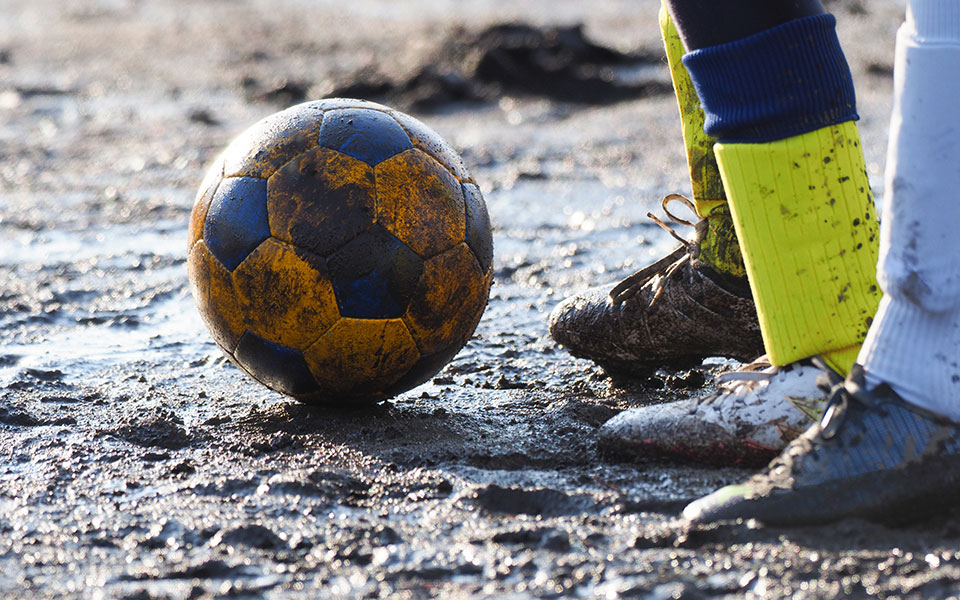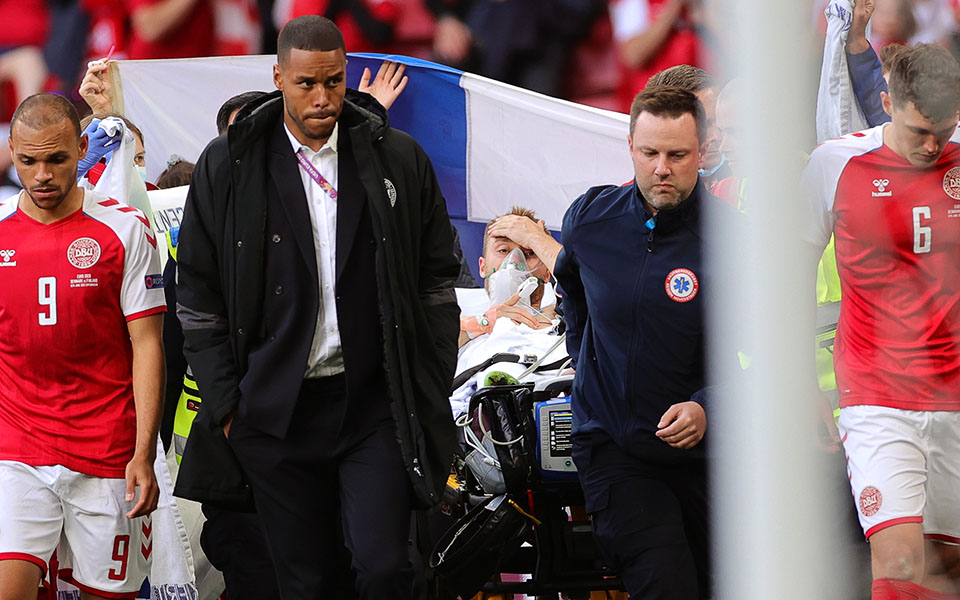
Previous Sunday, a soccer player, accurate 20 years, collapsed on the pitch during a match in Karditsa. Despite the inhuman efforts of doctors, the young footballer did not recover.
In 2016, the death of a 14-year-old Sotiri Nikolacopoulou, who died of a heart attack during a friendly match in Kalamata, shocked public opinion. A little bit later, was organized football tournament in his memory, the proceeds will be used to purchase a defibrillator. In the same year, he died in the same way. Charalambos Kamburidis ANDri Antoupoli at the Peristeri stadium.
In 2019 soccer player Christ Petridisduring the EPS Magnesia match, collapsed inside the stadium and a little later ended up in hospital.
In February 2022, the 22-year-old Alexander Lamps ended during the match between the teams of Iliupoli and Hermione. Last summer, 13 years old he had a heart attack and died in front of his parents who were watching the match at the stadium in Eretria.
Of course, the incident that is imprinted in the memory of the majority happened to him. Christian E.rickshaw, who collapsed to the ground in Denmark’s match against Finlandin time Euro 2021. Erickshaw he was saved by the fact that he played in a match of the highest sports organization and thanks to the presence specialized medical honor who put in superhuman effort.
Cardiac arrest is the most common cause of death in the Western world, killing 350,000 Europeans every year.
Although some initiatives have been taken in Greece, the question arises, and mainly regarding amateur sports: how ready are we to deal with such incidents? Are the security measures adequate? Are there people on the teams who know how to deal with such incidents?
What are the safety rules for accidents during football matches? Super Teams League 1 and 2 must have a fully equipped infirmary inside the stadium, as well as an ambulance (private or EKAV). Super League also appoints a doctor for every league match -Besides that is, of those who have commands-.
After the incident with E.rickshawEPO must teams playing in National League 3 must have a defibrillator on the playing field. In the lower categories – D’ National and local championships- everything “hangs in the air” and depends on budget and… the good intentions of each group.
At the same time, the volume of football horse racing held every Sunday really big. This year only in the 3rd National League 73 teams from five groups participate.

And, of course, there are local leagues. Each prefecture has a local A’, a local B’ and many times also a local C’. As the player of the 3rd team told “K”: “Every Sunday in the prefecture of Argolis, 15 matches are played at the same time. be in them private an ambulance can only be heard as a joke, but it can also be heard as a joke that AKAB ambulances are parked near all these matches.”
It is noted that immediately after the death of a 20-year-old footballer in Karditsa (from myocardial ischemia, as the forensic report showed), The EPO held an extraordinary meeting and decided to send a letter to the Central Association of Greek Municipalities. in which he asks that all municipalities that own stadiums be informed that the presence of a defibrillator is a prerequisite for their licensing.
Pharmacists as doctors
OUR Athanasius Palanzos, the coach of a 20-year-old who passed out in Karditsa four days ago, tells K that defibrillators are rare in local leagues. As he notes: “Obviously we didn’t have a defibrillator on the field, who he received; In all Karditsa there is not one in the junior ranks. When the young man fainted, the two-meter athlete, who always came out “clean” on cardiological tests, the man who acted as a doctor rushed to treat him. CPR. With a bulky first aid kit they move more doctors at regional competitions. What does “doctor’s duty” mean?
OUR Mr. Palanzos explains that the “doctor” of last Sunday’s match was “a local pharmacist who attended a CPR“. It should be noted that the ambulance in this case arrived at the stadium in 10 minutes.
However, even if defibrillators are present, their operation is not guaranteed. When the 22-year-old football player died in Ilioupolis in February 2022, the defibrillator was on the pitch but away from the playing area. Space. Some time passed before the athlete, and the ambulance reached the stadium in 20 minutes.

“It’s a matter of luck”
soccer player George Managers experienced first hand a delayed reaction to an accident on the field. In April 2021, her player JSC Sellano (in Trikala) collided with a player from the opposing team. OUR Managers lost them feelings from a strong collision, while he received a concussion, a fractured cheekbone and broken teeth. An ambulance from Larisa arrived 40 minutes later.
“I was lucky, because my team at that time made sure that there was always a Red Cross echelon at each of our matches,” he describes and continues: “When I lost consciousness, 2-3 doctors fell on me. Thanks to the great their efforts I returned. However, there was no defibrillator on the field.” He also notes that the Kalambaka team, in which he currently plays, It has defibrillator, but, as he emphasizes, she is the only one who has this necessary medical device in all of Trikala.
“The more charges are dropped, the worse it gets,” Mr. managers, and explains: “It’s a matter of luck what kind of security equipment your team will have. Local B leagues don’t even have a doctor most of the time. coincidence. And in the 3rd National League, however, many teams recruit people who only attended seminars so as not to get fined. I want to say, in connection with the EPO’s latest statement, that delaying decisions every time a tragic incident occurs does not solve the problem. We need prevention and control of what is observed at all levels.”
football player who compete in the Athens teams also raised the following parameter: “Our safety in the stadiums is judged not only by defibrillators and doctors. In most of the stadiums I’ve played in, turf is a luxury. The terrain is often so uneven that it’s a miracle we don’t get hurt all the time.”
The pre-sport part is also blurry check what athletes must do before receiving their card to compete, as determined by the EPO. According to the regulations, the athletes participating in the teams must undergo a cardiogram and a heart triplex and have a corresponding certificate from a cardiologist.
But as he notes in “K” about Light Patsourakos, cardiologist, vice president of the ISA (Athens Medical Association) and member of the working group on cardiovascular diseases of the Ministry of Health: “In many cases, especially in the region, checks are carried out … on the leg. Football players turn to a private individual who is paid by the team to issue mass certificates that, some time, they are processed. There is no mandatory individual image for each athlete. And it should be noted that triplexes require good doctors, necessarily cardiologists. Checks must be thorough – many athletes may necessity put a holter, for example. I saw kids who wanted to play sports and I explained to them that they couldn’t do it.”
At this moment Mr. Patsourakos emphasizes that the responsibility for good cardiac control lies largely with the athlete and his family. As explained experienced doctor: “Unfortunately, families often neglect this. However, it should be emphasized that all those who die in the stadiums do not die because of the mistreatment at the time or the bad about sport control”.
The medical examiner agrees. Dimitris Galanderis. He notes that cardiograms and Ultrasound “may” recognize many changes in the heart, but not all.
“THEN hypertrophic cardiomyopathy, for example, which is a common cause of footballers dying on the pitch worldwide, is a genetic problem that does not provide macroscopic evidence,” explains D. Galanderis and continues: “Anomaly in the growth of the coronary vessels is also not recognized by these tests. In every case, who checks if all these kids who compete in Greek stadiums are properly vetted?”
Both physicians are in fact emphasizing that controls must become even more thorough now that we are in the post-pandemic era and be proven how about coronavirus can cause pericarditis in some people.
AND. Palanzos, like other amateur football coaches, they think they need to add another cardiologist control in the middle of the year, so that they, like the players, feel more secure.
Finally, F. Patsourakos notes that the Commission on Cardiovascular Diseases, in which he participates, recommends that the Ministry of Health strengthen preventive measures, pre-sport examinations as part of a separate package, as, for example, in the case of the national program for the prevention of breast cancer.
Source: Kathimerini
David Jack is a sports author at 247 News Reel, known for his informative writing on sports topics. With extensive knowledge and experience, he provides readers with a deep understanding of the latest sports advancements and trends. David’s insightful articles have earned him a reputation as a skilled and reliable writer.